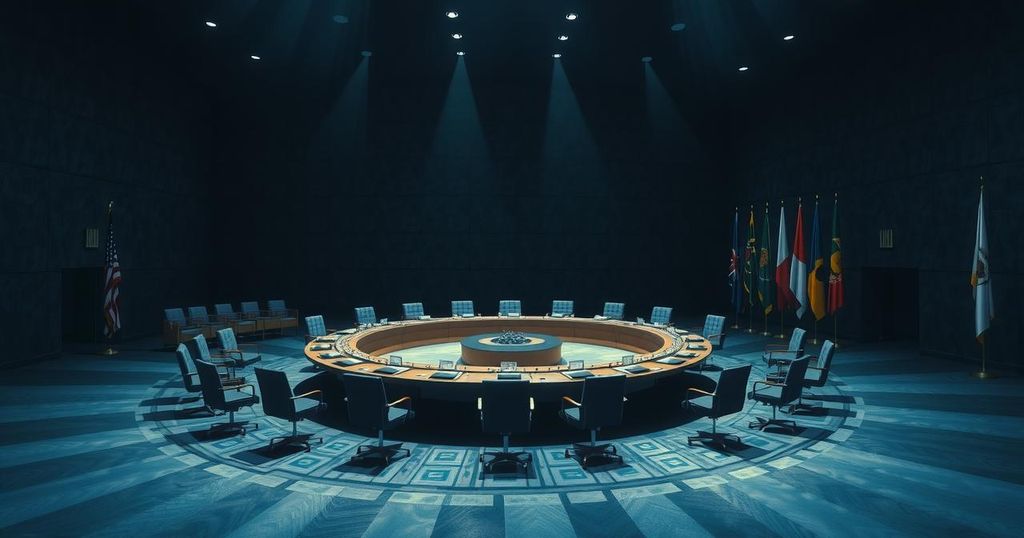World news
AFRICA, ANNA BORSHCHEVSKAYA, ASIA, BASHAR AL - ASSAD, CIVIL WAR, CONFLICT, DAMASCUS, EUROPE/ASIA, INTERAHAMWE, INTERNATIONAL RELATIONS, KR, KREMLIN, MOSCOW, NE, NORTH AMERICA, REUTERS, RUSSIA, RWANDA, SAMI, SAMIA NAKHOUL, SANCTIONS, SECURITY COUNCIL, SYRIA, SYRIAN CIVIL WAR, UN, UNITED NATIONS, UNITED STATES, WAR, WASHINGTON INSTITUTE
Marcus Chen
0 Comments
Russia Critiques Syria’s New Leadership Amid Rising Sectarian Violence
Russia condemned Syria’s new leadership during a closed UN meeting, comparing violence against Alawites to the Rwandan genocide. Despite its military interests, Moscow expressed concerns over the rise of jihadists and highlights risks of sectarian violence similar to Iraq’s post-war chaos. The meeting emphasized the importance of an inclusive political transition in Syria and the need for international engagement to address escalating tensions.
In a recent closed United Nations briefing, Russia sharply criticized Syria’s new leadership, highlighting concerns about the rise of jihadists and comparing sectarian violence against the Alawite minority to the Rwandan genocide. This criticism emerges despite Russia’s strategic interests in maintaining two military bases along Syria’s coast, where recent violence resulted in numerous Alawite fatalities.
The violence erupted on March 6, following an attack on the new government’s security forces, attributed to former military figures loyal to ousted president Bashar al-Assad. This triggered retaliatory killings of Alawites across several provinces, which raised alarms within the Kremlin regarding Syria’s stability and unity.
Moscow’s envoy at the UN, Vassily Nebenzia, emphasized in the private meeting that there has been no intervention to halt the escalating violence. He stated that the ongoing sectarian killings bore similarity to the systematic massacre of Tutsis during the 1994 Rwandan genocide. This level of stark criticism was notable as it reflects a broader strategy by Russia to reassert its influence in a volatile region.
While publicly Russia has called for unity in Syria, analysts suggest it is adopting a cautious approach to balance its interests. Anna Borshchevskaya from the Washington Institute asserts that Russia seeks to maintain an image as a global power alongside the United States, which necessitates collaborative private engagements rather than overt public criticisms that might undermine its objectives.
Nebenzia further articulated concerns regarding the new government’s disbanding of Syria’s army and significant public sector layoffs, warning that these actions could replicate the sectarian fallout seen in post-Saddam Iraq. He criticized the influx of foreign fighters who could potentially exacerbate the already tense situation on the ground.
In an interview, Syria’s interim president Ahmed al-Sharaa expressed the administration’s desire for an inclusive government, mentioning the potential inclusion of Alawites in governing positions. He reiterated the importance of maintaining cooperative relations with Russia.
The closed briefing concluded with discussions among Security Council members, including the United States, France, and China, regarding the role of foreign fighters and the political transition in Syria. A consensus statement condemning the violence and urging protection for all Syrians, irrespective of their ethnic or religious affiliations, was anticipated from the Council soon, reflecting the international community’s growing concern over Syria’s precarious situation.
The recent UN meeting revealed Russia’s deep concerns regarding Syria’s new leadership and the ongoing sectarian violence against the Alawite minority. By comparing the situation to the Rwandan genocide, Russia seeks to highlight the urgent need for intervention and stability in Syria. The emerging criticisms could align with a broader strategy to reclaim influence in the region while navigating the complexities of international relations. The call for an inclusive transitional government underscores the importance of unity among Syria’s diverse communities.
Original Source: www.usnews.com




Post Comment